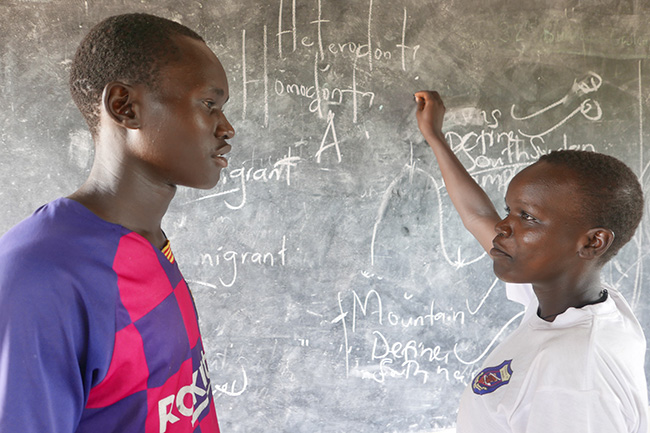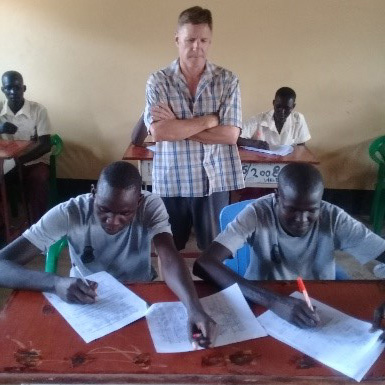Interview of Emmanuel Napuon, a secondary student. Here is his story:
My name is Emmanuel Napuon. I was born in 2002 in a small village called Lotakawa, south of Napil. I am the youngest of nine children (five boys and four girls) of my mother, Elizabeth Nakitibo. My father, Lucino Lopun, is quite old now. We are Toposa pastoralists, and my father has many cattle.
As a little boy, I looked after the animals at cattle camps far away. I never carried a gun. I ate milk, posho (corn meal) and dry sorghum (yes, we ate it just like that). Sometimes lions and hyenas would come at night. One time a lion tried to catch our animals. We tracked it. Then it actually turned on us and came after us. It became crazy and wouldn’t run away. The big men tried to shoot it. I ran away. I was quite scared.

Emmanuel says girls’ education is important.
Out there in the bush, we always encountered snakes. One incident still haunts me to this day. We had taken the goats to the river and had gone into the water with the animals. We did not see the python in the water. It reached out and grabbed my friend and killed him. I ran away. People tried to shoot it, but it was so difficult. Then the snake took him away under the water.
The first time I saw a khawaja (white person), I was surprised to see someone so different. Some people said they were devils. The first time I talked to a khawaja was in primary school in Kuron Peace Village. By then I wasn’t afraid because I knew that they were human and not devils.
In our Toposa culture, it is not common to go to school, but two of my older brothers finished basic education and are now at the university in Juba. After primary school, I went to Narus Secondary because at that time there was no school in Kuron. When our new secondary school in Matara opened, I returned to Kuron; I am now in Secondary 3.
My father and mother didn’t want me to go to school. It was my older brother who pushed for me to attend school. That first time, my father came and took me out of school. Then my brother talked to my father, and my father changed his mind. Being illiterate, he did not understand the need for education. Initially my older brother paid for my school fees, but later my father agreed to pay my school fees through the sale of some animals. Sometimes the teachers or Kuron Peace Village have helped us with school fees.

A school exam. Emmanuel is on the left
I was elected by the other students to be the deputy head boy. That meant I had to make sure that students got to their classes on time, report sicknesses, lack of food or any other complaints. So I was well respected.
There are many challenges in our secondary school because it is so new. We still don’t have dormitories, latrines, a kitchen or anything. I want to continue here even though conditions are difficult. We are the pioneers of this school and we have to persist. I feel duty-bound to see it through.
My dream is to graduate and continue my education. I don‘t want to drop out like others. I want to go on to university and perhaps study political science, which is one of my interests.
Kuron Peace Village gives a lot of things to this community. If it were not here, people would be fighting in conflicts and not be working for peace. Now they think about these things. The Peace Village has helped a lot of young people who would have been raiding cattle. Now those who graduate, for example, can go to other places to keep studying and make a better life for themselves.
I know the importance of education. My parents did not get an education; they have had to rely on their animals and agriculture. I now can see many opportunities. Sometimes I am able to give my parents advice. For example, I was able to persuade them to send two of my sisters to Narus Bakhita Primary School. I know that it is important for girls to be educated, which is a new attitude for Toposa men and has come about through the influence of Kuron Peace Village.
I have a cell phone and find it quite useful. I use Facebook for communication with my friends. I even have some friends in Germany.
Our people are beginning to see that animals are not the only way you can make a living. Education is now important. We aim to achieve something in our lives. We have to be ambitious to raise up our families from illiterate to literate. We were the first in our area to go to school. Now, we are seeing a change, as many people are taking their children to school. We are agents of change.
Adopted from: MaryKnol Lay Missionaries SSD

Comments
Post a Comment
Leave a message for the poet